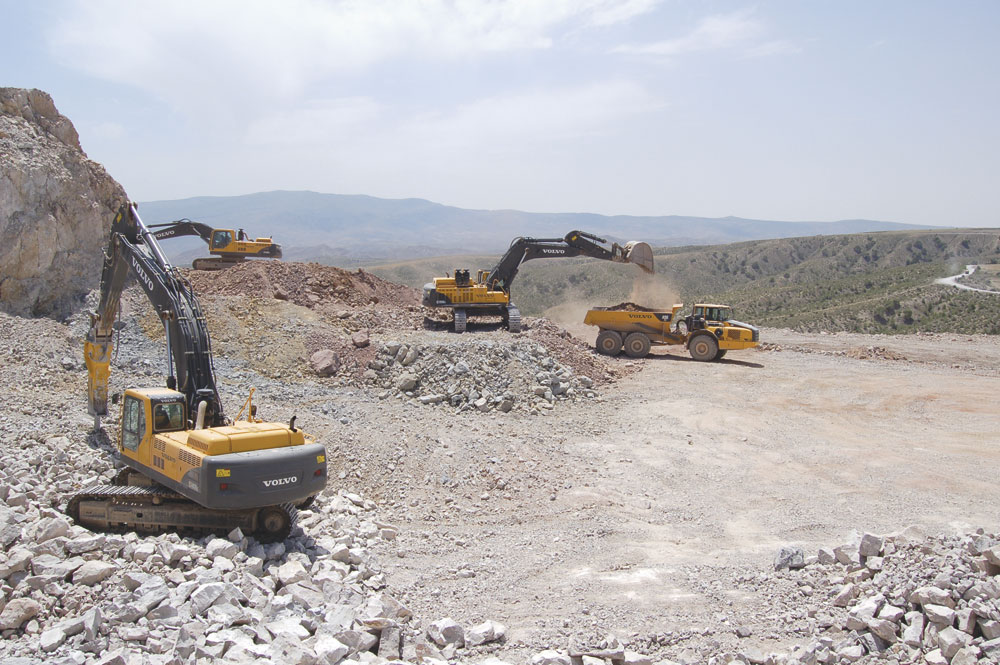Ships Of The Desert

Volvo articulated haulers working at El Mhir Quarry help develop Algeria’s growing infrastructure
Algeria is a vast, yet largely deserted, North African country, with much of its 2.4 million km2 lying within the arid zone of the Sahara Desert. Algeria was once an integral part of France, until it secured its independence in 1962.
Now, fuelled by its mineral riches, especially oil, the African country has embarked on an ambitious infrastructure development plan that will improve living conditions and the transport network for its population of around 35 million.
The key material in improving infrastructure on a national scale is concrete and the Algerian Government has been authorizing new licences to produce aggregates at carefully selected sites around the country.
El Mhir Quarry, 23km east of the capital Algiers, is one of these sites. Owned and operated by Bensebaa, the family-owned quarry operators had to wait four years for permission to work the site, which eventually came with a 50-year concession in 2007.
At 320,000m2, El Mhir required extensive preparatory works, including geological testing, constructing haul roads and installing a modern crushing plant on site. The entire process took two years to complete and the quarry finally went into production in late 2009.
White, hot and dusty
According to Bensebaa, there is much work to be done by the company’s 50 employees at El Mhir. The quarry has proven reserves down to 70m, giving the site an expected production lifespan of around 60 years.
‘One advantage of the site is that there is almost no overburden, which allows us to get right down to blasting,’ said chief mine engineer Abdelrachid Kirtache. ‘We have quickly ramped up production to our current output of 3,000 tonnes per day.’
At El Mhir, blasting is undertaken twice a month, a limitation set by local police authorities to prevent explosives falling into the hands of a small band of terrorists that Algeria is fighting against.
Each blast requires around 3.5 tonnes of dynamite, which puts over 50,000 tonnes of rock on the ground. As the exact timing of the delivery of the explosives is kept secret, Mr Kirtache has to be ready with his 120 bore holes well in advance of the blast.
A large proportion of the quarry’s output is sent to the company’s own concrete plant, some 60km away from the site, to produce kerbs and other products for use on highway developments. The biggest of these road projects is the East-West Highway, which stretches 1,200km from Algeria’s border with Tunisia on the east to Morocco on the west.
The right tools for the job
Among the Volvo machines used at the site are a pair of A35E articulated haulers, a pair of EC460BLC excavators, an EC700B excavator and two wheel loaders – an L180E and an L220E.
Although none of the haul roads exceed an incline of more than 10%, the turns are narrow and so the Volvo haulers’ agility has proven far greater than the rigid haulers that the company originally focused on.
Positioned at the rock face, the EC700B loads the haulers, while the EC460BLCs break the larger rocks and tidy up the face. The wheel loaders work in the yard loading the 100 trucks that arrive at the site each day.
‘It makes sense to give the workers the right tools for the job,’ explained Mr. Kirtache. ‘Of course, there are plenty of cheaper machines that I could have chosen, but we need support and reliability in the work we do. The Volvos are easy to use, comfortable and proving their worth every day in these very demanding conditions. People work harder and faster if they are comfortable and in these hot conditions features such as air-conditioning are necessities, not luxuries.’
Despite no moisture in the air to dampen the dust on site, the Volvo machines are proving highly resistant to the terrain, thanks to their extensive filters and regular maintenance.
There are ambitious plans for expanding El Mhir Quarry into a new zone that will be more than twice the size of the current plot. This will not happen overnight, but Volvo CE will be ready to help with the development of this increasingly important African country.


